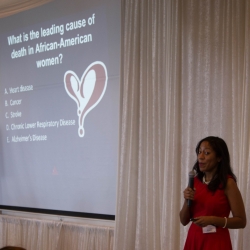By Khadijah Breathett, MD, MS
Heart failure disproportionately affects racial/ethnic minorities and women. Heart failure is a result of weakened heart muscle, usually caused by injury to the heart from a heart attack, high blood pressure, or abnormalities in a heart valve, for example.
 More than 6.5 million people are living with heart failure in the U.S.[1] Women represent over half of this population.[3] When categorized by race/ethnicity and sex, African-American women have the highest proportion of heart failure.[1] In addition, the lifetime risk of developing heart failure is highest in African-Americans and Hispanics compared to Caucasians and Asians.[3] The risk of developing heart failure increases with age for both sexes and all races and ethnicities. However, at each age group, African-American men and women develop heart failure at higher rates than other racial/ethnic groups, particularly before the age of 75.[1]
More than 6.5 million people are living with heart failure in the U.S.[1] Women represent over half of this population.[3] When categorized by race/ethnicity and sex, African-American women have the highest proportion of heart failure.[1] In addition, the lifetime risk of developing heart failure is highest in African-Americans and Hispanics compared to Caucasians and Asians.[3] The risk of developing heart failure increases with age for both sexes and all races and ethnicities. However, at each age group, African-American men and women develop heart failure at higher rates than other racial/ethnic groups, particularly before the age of 75.[1]
Heart failure has a high mortality rate. Approximately 50 percent of people will die from heart failure within 5 years of diagnosis. [1,4] Compared to men, women have a higher proportion of death attributed to heart failure. [1] Death rates from heart failure have declined with broader usage of evidence based treatments, but death rates are consistently higher among African-Americans than Causcasians or Hispanics. [5]
Multiple factors drive these disparities.
Racial/ethnic minorities have more modifiable diseases that increase the risk of developing heart failure, such as hypertension, diabetes, obesity, and atherosclerosis. [1,2,6] Furthermore, racial/ethnic minorities are more likely to be unaware of their diseases and have poorly controlled diseases. [1] In particular, African-American and Hispanic women have higher prevalence of these diseases than men of the same racial/ethnic groups. [1]
- Racial/ethnic minorities of lower socioeconomic position have higher risk for developing heart failure than Caucasians. [1] Racial/ethnic minorities have higher proportions of underinsurance, which is associated with less receipt of healthcare. [7]
- Healthcare provider bias may contribute to reduced delivery of evidence based heart failure treatments to racial/ethnic minorities and women. [8]
- Both racial/ethnic minorities and women are underrepresented in heart failure research studies. [2,9] Treatment options and approaches are not tailored to these populations.
A multi-targeted approach may reduce racial/ethnic and sex disparities in heart failure.
- Favorable lifestyle changes are associated with reduced risk of developing heart failure, particularly among African-Americans and Hispanics. [10] The American Heart Association “Life’s Simple 7” include the following lifestyle changes which help reduce risk of heart failure: monitoring and controlling blood pressure, cholesterol, and blood glucose levels, engaging in an active lifestyle, eating healthier meals, losing weight, and stopping usage of tobacco products. [10]
- Addressing structural inequalities in education, income, and health insurance coverage through patient empowerment, advocacy, and political involvement may help reduce the burden of heart failure. [11]
- Bias may be reduced by increasing awareness, teaching stereotype-replacement techniques, and developing positive relationships between healthcare providers and patients of diverse racial/ethnic groups. [12]
- Informed involvement in clinical research may promote improved population-level care. Trust must be rebuilt between diverse patient groups and healthcare providers.
Recognizing racial/ethnic and sex differences is the first step to overcome these disparities. It will take a concerted effort by patients, providers, and the health system to ensure equitable health care to all. So let’s bridge this gap together!

Dr. Breathett, assistant professor of medicine at the UA College of Medicine – Tucson, is board-certified in internal medicine, cardiology and advanced heart failure and transplant cardiology. Her research focuses on reducing racial/ethnic and gender disparities in advanced heart failure and preventing populations that experience disparities from developing advanced heart failure. Her published research appears in journals such as Circulation Heart Failure and Journal of American College of Cardiology Heart Failure. She also is the lead author of the chapter, “Review of Heart Failure Management in African-Americans,” in Management of Heart Failure.
References:
- Benjamin EJ, Blaha MJ, Chiuve SE, Cushman M, Das SR, Deo R, Ferranti SD de, Floyd J, Fornage M, Gillespie C, Isasi CR, Jiménez MC, Jordan LC, Judd SE, Lackland D, Lichtman JH, Lisabeth L, Liu S, Longenecker CT, Mackey RH, Matsushita K, Mozaffarian D, Mussolino ME, Nasir K, Neumar RW, Palaniappan L, Pandey DK, Thiagarajan RR, Reeves MJ, Ritchey M, Rodriguez CJ, Roth GA, Rosamond WD, Sasson C, Towfighi A, Tsao CW, Turner MB, Virani SS, Voeks JH, Willey JZ, Wilkins JT, Wu JH, Alger HM, Wong SS, Muntner P, Subcommittee O behalf of the AHASC and SS. Heart Disease and Stroke Statistics—2017 Update: A Report From the American Heart Association. Circulation. 2017;CIR.0000000000000485.
- Breathett K, Baliga RR, Capers Q. Review of Heart Failure Management in African-Americans [Internet]. In: Baliga RR, Haas GJ, editors. Management of Heart Failure. Springer London; 2015 [cited 2016 Feb 19]. p. 277–286.Available from: http://link.springer.com/chapter/10.1007/978-1-4471-6657-3_14
- Bahrami H, Kronmal R, Bluemke DA, Olson J, Shea S, Liu K, Burke GL, Lima JAC. Differences in the Incidence of Congestive Heart Failure by Ethnicity. Arch Intern Med. 2008;168:2138–2145.
- Roger VL, Weston SA, Redfield MM, Hellermann-Homan JP, Killian J, Yawn BP, Jacobsen SJ. Trends in heart failure incidence and survival in a community-based population. JAMA J Am Med Assoc. 2004;292:344–350.
- Products - Data Briefs - Number 231 - December 2015 [Internet]. [cited 2016 May 1];Available from: http://www.cdc.gov/nchs/products/databriefs/db231.htm
- Eaton CB, Pettinger M, Rossouw J, Martin LW, Foraker R, Quddus A, Liu S, Wampler NS, Hank Wu W-C, Manson JE, Margolis K, Johnson KC, Allison M, Corbie-Smith G, Rosamond W, Breathett K, Klein L. Risk Factors for Incident Hospitalized Heart Failure With Preserved Versus Reduced Ejection Fraction in a Multiracial Cohort of Postmenopausal Women. Circ Heart Fail. 2016;9.
- Breathett K, Allen LA, Helmkamp L, Colborn K, Daugherty SL, Khazanie P, Lindrooth R, Peterson PN. The Affordable Care Act Medicaid Expansion Correlated With Increased Heart Transplant Listings in African-Americans But Not Hispanics or Caucasians. JACC Heart Fail. 2017;5:136–147.
- Smedley B, Stith A, Nelson A. Unequal Treatment: Confronting Racial and Ethnic Disparities in Health Care (with CD) [Internet]. Institute of Medicine; 2003 [cited 2012 Jun 3]. Available from: https://download.nap.edu/openbook.php?isbn=030908265X
- Sardar MR, Badri M, Prince CT, Seltzer J, Kowey PR. Underrepresentation of Women, Elderly Patients, and Racial Minorities in the Randomized Trials Used for Cardiovascular Guidelines. JAMA Intern Med. 2014;174:1868–1870.
- Ogunmoroti O, Oni E, Michos ED, Spatz ES, Allen NB, Rana JS, Virani SS, Blankstein R, Aronis KN, Blumenthal RS, Veledar E, Szklo M, Blaha MJ, Nasir K. Life’s Simple 7 and Incident Heart Failure: The Multi-Ethnic Study of Atherosclerosis. J Am Heart Assoc. 2017;6.
- Breathett K, D’Amico R, Adesanya TMA, Hatfield S, Willis S, Sturdivant RX, Foraker RE, Smith S, Binkley P, Abraham WT, Peterson PN. Patient Perceptions on Facilitating Follow-Up After Heart Failure Hospitalization. Circ Heart Fail. 2017;10.
- Zestcott CA, Blair IV, Stone J. Examining the Presence, Consequences, and Reduction of Implicit Bias in Health Care: A Narrative Review. Group Process Intergroup Relat GPIR. 2016;19:528–542.

